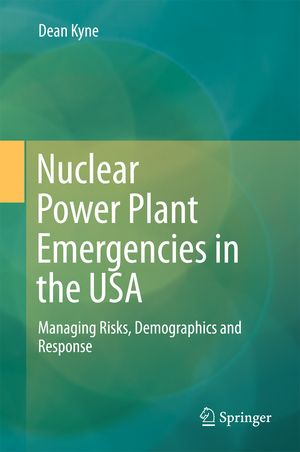Nuclear Power Plant Emergencies in the USA: Managing Risks, Demographics and Response
Autor Dean Kyneen Limba Engleză Hardback – 13 feb 2017
The book presents detailed analysis on effectively managing nuclear power emergencies. In an attempt to illustrate minimizing the risks, factual answers to the key questions surrounding managing nuclear disasters are outlined. What are the risks associated with the nuclear power plants (NPP)? What are the problems associated with managing nuclear power core-meltdown accidents in the three historic accidents? Where are the geographical locations of the 99 commercial reactors in the U.S? Who are those exposed to potential risks associated with the NPPs? How could a projection of radioactive plume dispersion pathway be carried out using a spatial computer code, such as the Radiological Assessment Systems for Consequence Analysis (RASCAL) in case of a core-meltdown accident? Where would the radioactive plume go given weather conditions? Who are more likely to be exposed to the high level radiation dose during the core-meltdown accident? What are the issues with the current radiological emergency plan?
| Toate formatele și edițiile | Preț | Express |
|---|---|---|
| Paperback (1) | 789.97 lei 38-44 zile | |
| Springer International Publishing – 9 sep 2018 | 789.97 lei 38-44 zile | |
| Hardback (1) | 809.95 lei 38-44 zile | |
| Springer International Publishing – 13 feb 2017 | 809.95 lei 38-44 zile |
Preț: 809.95 lei
Preț vechi: 1065.72 lei
-24% Nou
Puncte Express: 1215
Preț estimativ în valută:
155.03€ • 168.46$ • 130.31£
155.03€ • 168.46$ • 130.31£
Carte tipărită la comandă
Livrare economică 17-23 aprilie
Preluare comenzi: 021 569.72.76
Specificații
ISBN-13: 9783319503424
ISBN-10: 3319503421
Pagini: 359
Ilustrații: XV, 359 p. 125 illus., 119 illus. in color.
Dimensiuni: 155 x 235 x 25 mm
Greutate: 0.85 kg
Ediția:1st ed. 2017
Editura: Springer International Publishing
Colecția Springer
Locul publicării:Cham, Switzerland
ISBN-10: 3319503421
Pagini: 359
Ilustrații: XV, 359 p. 125 illus., 119 illus. in color.
Dimensiuni: 155 x 235 x 25 mm
Greutate: 0.85 kg
Ediția:1st ed. 2017
Editura: Springer International Publishing
Colecția Springer
Locul publicării:Cham, Switzerland
Cuprins
The U.S. commercial nuclear power plants and their potential risks.- Communities hosting U.S. commercial nuclear power plants.- Nuclear Power Emergencies and their Management Process.- Simulation of nuclear power plant core-meltdown accidents.- Issues Associated with Nuclear Power Emergencies.- Conclusions.
Notă biografică
Dean Kyne is Assistant Professor of Environmental Sociology at the Department of Sociology and Anthropology, College of Liberal Arts, at the University of Texas Rio Grande Valley. Being an Environmental Social Scientist and Geographer, he has conducted research studies covering issues related to nuclear power plants, disaster and emergency management, environmental justice, social capital index and siting controversial facilities.
Textul de pe ultima copertă
Managing nuclear power emergencies is significantly different from managing other types of emergencies, including fire, flood, and other disasters because nuclear disaster management requires special technical skills and a rigid protocol which outlines detailed steps and procedure before an evacuation announcement could be made. It was evident that the impacts from a nuclear power core-meltdown accident were immerse, irreversible, and inevitable, as evident by evaluating the three historic core-meltdown accidents, namely Three Mile Island in 1997, Chernobyl in 1986, and Fukushima Daiichi in 2011. The three options for minimizing the risks associated with NPPs are suggesting elimination of all NPPs in operation in the United States, transforming inevitable risks to evitable risks, and transforming the current radiological plan into an effective emergency management plan. Being the latter option is the only viable one, this book provides a comprehensive understanding on effectively managing nuclear power emergencies in the U.S.
The book presents detailed analysis on effectively managing nuclear power emergencies. In an attempt to illustrate minimizing the risks, factual answers to the key questions surrounding managing nuclear disasters are outlined. What are the risks associated with the nuclear power plants (NPP)? What are the problems associated with managing nuclear power core-meltdown accidents in the three historic accidents? Where are the geographical locations of the 99 commercial reactors in the U.S? Who are those exposed to potential risks associated with the NPPs? How could a projection of radioactive plume dispersion pathway be carried out using a spatial computer code, such as the Radiological Assessment Systems for Consequence Analysis (RASCAL) in case of a core-meltdown accident? Where would the radioactive plume go given weather conditions? Who are more likely to be exposed to the high level radiation dose during the core-meltdown accident? What are the issues with the current radiological emergency plan?
The book presents detailed analysis on effectively managing nuclear power emergencies. In an attempt to illustrate minimizing the risks, factual answers to the key questions surrounding managing nuclear disasters are outlined. What are the risks associated with the nuclear power plants (NPP)? What are the problems associated with managing nuclear power core-meltdown accidents in the three historic accidents? Where are the geographical locations of the 99 commercial reactors in the U.S? Who are those exposed to potential risks associated with the NPPs? How could a projection of radioactive plume dispersion pathway be carried out using a spatial computer code, such as the Radiological Assessment Systems for Consequence Analysis (RASCAL) in case of a core-meltdown accident? Where would the radioactive plume go given weather conditions? Who are more likely to be exposed to the high level radiation dose during the core-meltdown accident? What are the issues with the current radiological emergency plan?
Caracteristici
Presents a detailed insight into nuclear power induced disaster management process Highlights statistical associations and estimations of radiation doses Details the problems and priorities of nuclear power induced disaster management Includes supplementary material: sn.pub/extras


























